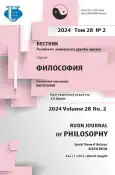I. Kant and the Tradition of Mystical Pantheism in European Philosophy
- Autores: Evlampiev I.I.1
-
Afiliações:
- Saint Petersburg State University
- Edição: Volume 28, Nº 2 (2024): KANT IN RUSSIA
- Páginas: 525-542
- Seção: PHILOSOPHY OF RELIGION
- URL: https://journal-vniispk.ru/2313-2302/article/view/325433
- DOI: https://doi.org/10.22363/2313-2302-2024-28-2-525-542
- EDN: https://elibrary.ru/ULVXBP
- ID: 325433
Citar
Texto integral
Resumo
In the research based on the analysis of the works “On the form and principles of the sensory and intelligible world” and “The only possible basis for proving the existence of God,” it is proved that I. Kant consciously based his philosophical system on the metaphysics of mystical pantheism, according to which the earthly world is the result of the “internal” transformation of the apophatic Absolute, and human consciousness must be considered as an act of the Absolute that realizes this transformation. With this approach, space and time, as forms of pure sensory contemplation, may be interpreted as an expression of the coexistence of all things in the Absolute and the constancy of their connection with the Absolute. It is precisely this understanding of them that is present in Kant’s early works. The article substantiates the assertion that the ontological proof of the existence of God constitutes an important component of Kant’s philosophy. In the pre-critical period, he had not yet completely gotten rid of his adherence to orthodox, church ideas about God, and therefore the ontological proof was contradictory and inconsistent. In the Critique of Pure Reason, Kant does not reject the ontological proof, but makes it truly consistent, fully consistent with the metaphysics of mystical pantheism. What is being proven here is not the existence of God the Absolute (this is impossible, since God is Divine Nothing), but the presence in consciousness of unconditional being (“matter of perception”), which is the manifestation of the Absolute in its finit form and from which the objective world is created through acts of consciousness. The article shows the presence of many parallels between Kant’s system and the teachings of John Scotus Eriugena and Nicholas of Cusa, who created the most famous versions of mystical pantheism.
Sobre autores
Igor Evlampiev
Saint Petersburg State University
Autor responsável pela correspondência
Email: yevlampiev@mail.ru
ORCID ID: 0000-0002-7209-2616
Código SPIN: 8459-2723
DSc in Philosophy, Professor, Department of Russian Philosophy and Culture, Institute of Philosophy
7-9 Universitetskaya emb., 199034, Saint Petersburg, Russian FederationBibliografia
- Evlampiev II. Undistorted Christianity and its fate in European history. Saint Petersburg: TsSO publ.; 2024. (In Russian).
- Kant I. On the form and principles of the sensually perceived and intelligible world. In: Works. 6. Vol. 2. Moscow: Mysl’ publ.; 1964. P. 381–426. (In Russian).
- Schelling FWJ. Philosophical studies on the essence of human freedom and related subjects. In: Works. 2. Vol. 2. Moscow: Mysl’ publ.; 1989. P. 86–158. (In Russian).
- Fichte IG. The Way Towards the Blessed Life. Moscow: Kanon+ publ.; 1997. (In Russian).
- John Scotus Eriugena. About the division of nature. Book IV. In: Anthology of medieval thought (Theology and philosophy of the European Middle Ages). In 2 vols. Vol. 1. Neretina SS, editor. Saint Petersburg: RkhGA publ.; 2001. P. 166–189. (In Russian).
- John Scott. Perifuseon <On the division of nature>. Book I. In: Philosophy of nature in antiquity and the Middle Ages. Gaidenko PP, Petrov VV, editors. Moscow: Progress-Tradition publ.; 2000. P. 480–529. (In Russian).
- Heidegger M. Thesis Kanat on Being. In: Time and Being. Moscow: Republic publ.; 1993. P. 361–390. (In Russian).
- Kant I. New coverage of the first principles of metaphysical knowledge. In: Works. In 6 vols. Vol. 1. Moscow: Mysl’ publ.; 1963. P. 263–314. (In Russian).
- Protopopov IA. The problem of ontological proof and the concept of the transcendental ideal in Kant’s philosophy. In: EINAI: Problems of philosophy and theology. 2012. Vol. 1. No. 1/2. P. 74–107. (In Russian).
- Fisher M., Watkins E. Kant on the Material Ground of Possibility: From “The Only Possible Argument” to the “Critique of Pure Reason”. In: The Review of Metaphysics. 1998;52(2):369–395.
- Kant I. The only possible basis for proving the existence of God. In: Works. In 6 vols. Vol. 1. Moscow: Mysl’ publ.; 1963. P. 391–510. (In Russian).
- Nicholas of Cusa. On the possibility-being. In: Works. In 2 vols. Vol. 2. Moscow: Mysl’ publ.; 1980. P. 135–182. (In Russian).
- Logan I. Whatever Happened to Kant’s Ontological Argument? In: Philosophy and Phenomenological Research. 2007;74(2):346–363.
- Kant I. Critique of pure reason. In: Works. In 6 vols. Vol. 3. Moscow: Mysl’ publ.; 1963. (In Russian).
- Meister Eckhart. Spiritual sermons and discussions. Moscow: Publishing House of Political Literature; 1991. (In Russian).
- Nicholas of Cusa. About non-other. In: Works. In 2 vols. Vol. 2. Moscow: Mysl’ publ.; 1980. P. 183–248. (In Russian).
- Nicholas of Cusa. Books of the simpleton. In: Works. In 2 vols. Vol. 1. Moscow: Mysl’ publ.; 1979. P. 359–460. (In Russian).
Arquivos suplementares









